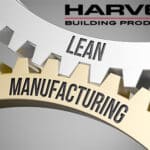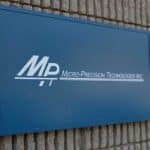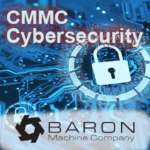Stamping Technologies Sees ISO Certification as a Continuous Process
Company Background:
The year was 1990 when Mark St. Gelais, now President of Stamping Technologies located in Laconia, New Hampshire, left his family’s business to start his own company. Borrowing $125,000 and moving into 1,200 square feet of space, Mark with one other employee started Stamping Technologies and went to work stamping out components for the electronics industry.
The first couple years were tough, but by year three things began to turn around. They hired two more employees and had moved into 2,400 square feet of space. Around that time Mark’s wife Johanna, while working for another company during the day, began doing the bookkeeping for Stamping Technologies at night. By year five she was working at Stamping Technologies full time as Office and Finance Manager. Then in 1997 they moved into 2,500 square feet of space. Finally in 2000 they moved into a 10,000
square foot facility which is where they are today. The number of employees has also grown to 25 and they are looking to hire more.
Stamping Technologies is well known as a supplier of world class metal stamped components to the electronics industry with customers in both the U.S. and overseas. Their primary market is in military applications. But they also serve the telecom, satellite, automotive, medical and various commercial industries as well. Stamping Technologies is committed to providing customers with cost effective, high quality precision parts with an ongoing investment in state of the art manufacturing equipment.
Situation:
It all started in 2010 when one of their large customers began putting pressure on them to get ISO certified. “This caught us off guard,” said Mark St. Gelais. “We heard horror stories about ISO certification. We really didn’t know how to go about it.”
Then in 2011 they heard about and attended an information session put on by the New Hampshire Manufacturing Extension Partnership (NH MEP). “The info session went over what ISO certification was all about and let us know about the NH State job training grant program to help offset the cost.” said Mark. They took advantage of the grant, and along with his wife Johanna attended NH MEP’s ISO 9001:2008 Collaborative Program in 2012.
The NH MEP ISO 9001:2008 Collaborative Program allows small to medium size companies undertake the ISO certification process. NH MEP with the support of its partner Exolytics created a program designed to develop and train SME’s on ISO 9001:2008 at an affordable cost.
Because it was a collaborative program a small group of companies participated in it together. They bounced ideas off each other, discussed different strategies, and went over what was learned in class and what was done did on-site. “What I liked most was we learned from one another. We shared information and that interaction was so important.” said Johanna St. Gelais.
After completing the NH MEP ISO 9001:2008 Collaborative Program, Stamping Technologies was awarded ISO 9001:2008 certification in 2012. Everything was in place. Their customers were now pleased they were ISO certified. Then it came time for the 1SO 9001:2015 upgrade.
Because it was a collaborative program a small group of companies participated in it together. They bounced ideas off each other, discussed different strategies, and went over what was learned in class and what was done did on-site. “What I liked most was we learned from one another. We shared information and that interaction was so important.” said Johanna St. Gelais.
After completing the NH MEP ISO 9001:2008 Collaborative Program, Stamping Technologies was awarded ISO 9001:2008 certification in 2012. Everything was in place. Their customers were now pleased they were ISO certified. Then it came time for the 1SO 9001:2015 upgrade.
Solution:
Mark and Johanna found out about the upgrade from ISO 9001:2008 to ISO 9001:2015 in 2016. Because the upgrade was needed to continue with being ISO certified, it was a necessary next step they had to accomplish. Again they turned to NH MEP and signed up for their ISO 9001:2015 Upgrade Collaborative Program.
The program’s collaborative format was the same but they found out ISO procedures had changed somewhat. “Going from ISO 2008 to 2015 was tough,” said Johanna. “It was more risk based, more precautionary in scope. And processes and procedures had to be explained to our employees more fully. They needed to really understand how ISO effects what we do as a company and how they are more accountable in the process.”
Overall they got through it fine and was awarded ISO 9001:2015 certification in 2017.
Results:
Stamping Technologies is no longer concerned about losing out on business because of not being ISO certified. “ISO certification lifted the road blocks for us to acquire new customers and retain old ones,” said Mark. “All you need to do is show them the ISO certificate and you’re done.”
“ISO certification also gave our employees more ownership in their work,” said Johanna. “Accountability of keeping up with ISO quality standards is now part of all of our employees’ work ethic.” To that end Johanna provides each new hire a package of information about ISO as soon as they come on board. This lets them know what the company requires and what is expected of them.
The following results for Stamping Technologies can be credited by having gone through the NH MEP ISO 9001:2015 Upgrade Collaborative Program:
- $500,000 in new sales in 2018
- Retained sales of $250,000 in 2018 that otherwise would have been lost
- Retained 10 customer orders in 2018
- Added 4 new fulltime employees in 2018 and looking to hire more in 2019
- Increased investment in workforce practices or employee skills at the cost of $2000 in 2018
- Increased investment in new products or processes at the cost of $39,000 in 2018
- Increased investment in plant or equipment at the cost of $75,000 in 2018
- Increased investment in new information systems or software at the cost of $9,500 in 2018
Testimonial:
“Going thru the NH MEP certification programs for ISO was one of the best decisions Stamping Technologies could have made.”
– Mark St. Gelais, President, Stamping Technologies Inc.






